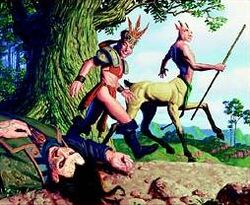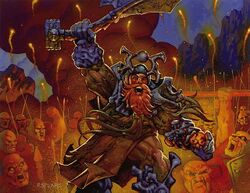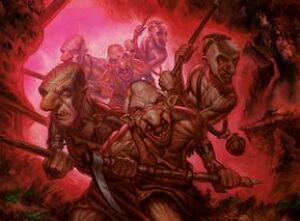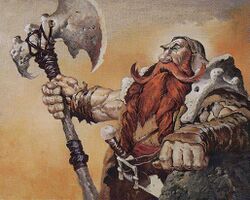Dwarf
| Dwarf | |
|---|---|
| Creature Type | |
| (Subtype for creature/kindred cards) | |
| Introduced |
Alpha (updated) Fallen Empires (printed) |
| Last used | Final Fantasy Commander |
| Beeble Scale | 3[1] |
| Scryfall Statistics | |
|
139 cards | |
|
6 token creation cards | |
|
12 typal cards | |
|
256 artworks | |
Dwarves are very similar to Humans but shorter. Many males wear long beards and live in mines, although some of them are known to live outside the mountains and even on islands.[2]
The first cards to bear the creature type were from Fallen Empires as Dwarven Warriors from Alpha used the pluralized form. Because the original dwarves filled the same role in the game as goblins, small red creatures, they were often absent.[3][4] After Eventide, dwarves have been absent from standard sets,[5] but were reintroduced in the Kaladesh block.
Dwarves were originally mono-red creatures that were briefly shifted to white/red in Shadowmoor, but when reintroduced in Kaladesh, they were functionally mono-white[6] (with a few white/red multicolor designs). In their subsequent appearances (starting with Throne of Eldraine), they included almost an equal number of white and red cards.
Storyline
Arcavios
Although admission to Prismari isn't unprecedented, dwarvish students at Strixhaven are renowned for their work in Lorehold college. Indeed, many of the artifacts and spirits studied by the college are dwarven in origin.
Avishkar/Kaladesh
Avishkari dwarves lean heavily to white mana, reflecting their focus on quality and order.[7] With the deep focus of Avishkar on technology, many dwarves are Artificers. These meticulous artisans have an unparalleled work ethic. They rely on proven tools and methods, and they relish the physical process of construction.[8] Other Avishkari races claim that dwarves are unable to feel fear. Having no concept of laziness or shortcuts, dwarves were valued within the Consulate for their work ethic.[9]
Dominaria


The dwarves of Dominaria are few and have been dwindling in population due to the plane's string of catastrophic events.
Jamuraan Dwarves
These dwarves live in the Ekundu Mountains between Suq'Ata and Femeref. When the Suq'Atans settled on their land, the dwarves journeyed south, where they allied with Femeref. This alliance led to tension between Femeref and Zhalfir when the amount of gold coming from the Femeref mines suddenly increased greatly, thanks to dwarven technology.
Pardic Dwarves
These dwarves lived in the Pardic Mountains on Otaria alongside several human barbarian tribes. The Pardic dwarves were hardy miners and doughty warriors inclined toward passionate, explosive personalities.[10] They exulted in battle, favoring swarm tactics supplemented by fire magic and destruction of enemy resources. Some of these dwarves were enslaved by the Cabal.
It is unknown if the Pardic dwarves survived Karona's coming and the ensuing calamity.
Sardian Dwarves
These dwarves lived in the Sardian Mountains on Terisiare during the Brothers' War. Legend says that the Golgothian Sylex was made from the melted heart of a mountain hammered into shape by them.[11] They provided the primal clay that Urza used to create his clay statues and the Colossus of Sardia. After years of service, Urza found out that the dwarves were trading with Mishra too; they eventually rose against Argive, and for this, they were slaughtered.
Their mountains were devastated during the war, and their population slowly diminished during the Ice Age due to dwindling resources and predation by yetis. Whether they survived past the Ice Age is unknown.
Sarpadian Dwarves
These dwarves lived in the Dwarven Stronghold in the Sarpadian Mountains. When the climate cooled and the goblins and orcs of Sarpadia migrated away from their ancestral lands, the empire of the dwarves was the first to fall before their onslaught. Summoning the Lady of Otaria, she teleported them to salvation on Terisiare.[12] It is believed by modern dwarves that they will return to save dwarvenkind from great peril.
Stone Dwarves
Not much is known about these blue-skinned dwarves save that they practiced powerful magic, harnessing the elements of earth and fire. A group of stone-dwarven Stone Druids appeared during the final stages of the Phyrexian Invasion of Dominaria and caused the volcano in which the Rathi Stronghold was situated to erupt. Their leader was Sister Nadeen Dormet. What became of the stone dwarves after the Invasion is unknown.
Eldraine
On Eldraine, Dwarves are the primary inhabitants of the Court of Embereth, and as such are heavily aligned toward red mana. They are industrious people led by a council. One of the council's members is Thane Torbran.
The dwarves of the Wilds of Eldraine are industrious artisans who value hard work and independence.[13] They include miners, jewelers, blacksmiths, and other artisans, and control over natural resources is an important aspect of dwarf society. While most of them highly value their ability to take care of themselves and pull their weight, they ultimately prefer strength in numbers. Dwarves usually choose to live in tight-knit family groups that hold claim to mineral deposits. Dwarf households are underground, carved out of massive crystals and gems, and far away from natural light sources.
Eldraine's dwarves have a longstanding feud with their redcaps, caused long ago by a dispute over a spoon, though it had raged for so long that no one could quite recall how it started.[14] The feud boiled over in a massive food fight known as the Assault on Delverhaugh.
Ancient dwarven ruins are located below the village of Edgewall, and are currently inhabited by the rat Lord Skitter.[15]
Kaldheim
The dwarves of Kaldheim inhabit Axgard, a harsh land defined by towering, rugged mountains and expansive rocky plains.[16] Famed across all the realms, dwarves are especially known for two defining qualities: crafting flawless weapons and weaving captivating tales. Their creativity burns passionately, driven by an unending desire to refine their skills and perfect their art. Whether forging the sharpest blades, crafting intricate jewelry, or forging unbreakable chains, dwarves dedicate themselves to excellence. Equally important to them is the preservation of their legacy through song and story, celebrating their feats and ensuring their names endure for generations to come.
Dwarven society is structured around extensive, loosely connected clans that settle in distinct areas within their vast underground city.[16] Each clan tends to specialize in particular crafts or skills, fostering a spirit of both cooperation and rivalry. While the clans live in relative harmony, their intense competitiveness often sparks disputes and contests to prove superiority in craftsmanship or valor.
For dwarves, a warrior and a skilled artisan are the same.[16] The art of combat and the art of creation draw from the same principles of focus, patience, and constant self-improvement. Every warrior-artisan has a signature weapon, which they unveil when they become adults on their 100th birthday; Their last names are based on these weapons. Red- and white-aligned dwarves approach these processes differently, but the perfection of their craft is equally important to both.
Red-aligned
Red-aligned dwarf warrior-artisans are prone to bursts of wild inspiration and get easily absorbed in their current projects.[16] They produce weapons of staggering raw power—hammers that split the earth where they strike, blazing-hot swords that melt armor with a swing, and javelins that trail searing bolts of lightning behind them.
White-aligned
White-aligned dwarf warrior-artisans are methodical and detailed.[16] They follow disciplined processes and are capable of finer, more nuanced work than their red-aligned kin. Beautiful jewelry, armor that makes the wearer invisible, and chains forged from a wolf's tears are some examples of the handiwork of white-aligned dwarves. They are every bit as precise and meticulous in combat as they are in the forge.
Chanters and Battle skalds
Skalds (dwarf clerics) hold a special place in dwarven society as the chief storytellers, the repositories of the sagas and fables that remind the dwarves of who they are.[16] Since the dwarves keep no written history, storytellers are the bearers of an intricate oral tradition that has been passed down through countless generations. A skald is welcome in any dwarven community, always treated as an honored guest.
Chanters are skalds whose primary function is to remind the dwarves of the deeds of the past and inspire the dwarves of today to similarly heroic deeds.[16] They tell tales of heroes to help shape new heroes; they tell tales of justice and community to strengthen the bonds of community and the commitment to justice.
Battle skalds earn their title by returning home from battle to tell the story of the battle and its heroes.[16] Their function is to collect tales of present heroism and accomplishment. They are revered across the realms for their bravery and storytelling ability, and they're often enlisted by adventurers or even gods to bear witness to some monumental feat.
Lorwyn-Shadowmoor
Duergars

The dwarves of Shadowmoor are 3-foot-tall, twisted, gnome-like creatures known as duergars.[17][18] The duergars live isolated lives deep beneath the surface in vast mines and tunnels where they constantly toil in search of riches. They are hard workers who can labor toward a single task for decades.
Duergars are very different in appearance from most other dwarves. They have gnarled bodies with spindly limbs and oversized heads with bulbous noses and drooping ears. Duergars are bald and have no beards, though some males have stubbly chins or wispy sideburns. These dwarves are so malformed that some resemble goblins.
The duergars live so far underground that some are not even aware of the surface world or dismiss it as a myth, becoming angry or violent when their illusions are shattered. Some duergar communities are further up and open out to the surface, though, and are guarded by duergars who have grown too fat to squeeze through the deeper tunnels.
The duergars did not exist in Lorwyn before the Great Aurora, and their current fate is unknown.
Ulgrotha
The dwarves of Ulgrotha arrived on that plane through an underground portal from an unknown world. They founded a city there called New Freedom and on top of this underground city, they built a fortress called the Castle of Morning Light. Some of them went to explore the rest of the plane in their ships, but while they were away Baron Sengir and his minions invaded New Freedom, chased the dwarves away, and even turned their princess Irini into a vampire whom he adopted as his daughter.
Sea Dwarves
Land Dwarves
Universes Beyond
In Lord of the Rings, dwarves (33 cards ) are one of the main races found in the world with their kingdoms in the mountains.
In Final Fantasy, the Lalafell (15 cards ) are a rotund and diminutive humanoid gnome-like race that have been referred to as dwarves.
Notable dwarves
- Unknown plane
Gallery
-
Dwarven Demolition Team
Tokens
| Token name | Color | Type line | P/T | Text box | Source | Printings |
|---|---|---|---|---|---|---|
| Dwarf | Creature — Dwarf | 1/1 | ||||
| Dwarf Berserker | Creature — Dwarf Berserker | 2/1 | ||||
| Hammers of Moradin | Creature — Dwarf Cleric | 3/3 |
| Token name | Color | Type line | P/T | Text box | Source | Printings |
|---|---|---|---|---|---|---|
| Seven Dwarves | Creature — Dwarf | 2/2 | Seven Dwarves gets +1/+1 for each other creature named Seven Dwarves you control. A deck can have up to seven cards named Seven Dwarves. |
Trivia
- Shadowmoor's Duergar are based on the English folkloric creatures also called Simonside Dwarves.
References
- ↑ Mark Rosewater (2023-02-11). "Can I get a update on the beeble score for Dwarves?". Blogatog. Tumblr.
- ↑ Mark Rosewater (November 21, 2005). "Thirty-Two Short Columns About Dwarves". magicthegathering.com. Wizards of the Coast.
- ↑ Mark Rosewater (February 04, 2002). "Here's Looking at You, Squid". magicthegathering.com. Wizards of the Coast.
- ↑ Magic Arcana (November 23, 2005). "Dwarves in Battle". magicthegathering.com. Wizards of the Coast. Archived from the original on 2021-04-29.
- ↑ Matt Cavotta (November 23, 2005). "Metadwarfosis". magicthegathering.com. Wizards of the Coast. Archived from the original on 2019-12-03.
- ↑ Jeremy Jarvis, Kimberly Kreines, Ari Levitch, Doug Beyer, and Aaron Forsythe (September 3, 2016). "Magic at PAX: Kaladesh World-Building Panel (Video)". Magic: The Gathering. YouTube.
- ↑ Planes of Existence: Kaladesh. Wizards of the Coast. Archived from the original on January 25, 2022. Retrieved on September 3, 2016.
- ↑ Magic Creative Team (November 2, 2016). "Planeswalker's Guide to Kaladesh". magicthegathering.com. Wizards of the Coast.
- ↑ Plane Shift – Kaladesh
- ↑ Magic Arcana (January 21, 2002). "The Dwarves". magicthegathering.com. Wizards of the Coast. Archived from the original on 2020-11-11.
- ↑ Miguel Lopez and Jeff Grubb (October 26, 2022). "The Brothers' War - Episode 5: As Cruel, As Necessary". magicthegathering.com. Wizards of the Coast.
- ↑ Ethan Fleischer (September 10, 2022). "The New Argive Megathread". Twitter.
- ↑ Chris Mooney (October 31, 2019). "Planeswalker's Guide to Eldraine". magicthegathering.com. Wizards of the Coast.
- ↑ Shared Animosity (Wilds of Eldraine)
- ↑ James Wyatt et al. (2023). "D&D Monstrous Compendium: Vol. 4: Eldraine Creatures". Wizards of the Coast.
- ↑ a b c d e f g h Ari Zirulnik and Jenna Helland (January 14, 2021). "Planeswalker's Guide to Kaldheim, Part 2". magicthegathering.com. Wizards of the Coast.
- ↑ Doug Beyer (July 30, 2008). "Concepting Eventide, Part 2". magicthegathering.com. Wizards of the Coast. Archived from the original on 2020-11-12.
- ↑ (2008). Eventide Player's Guide. Wizards of the Coast.

